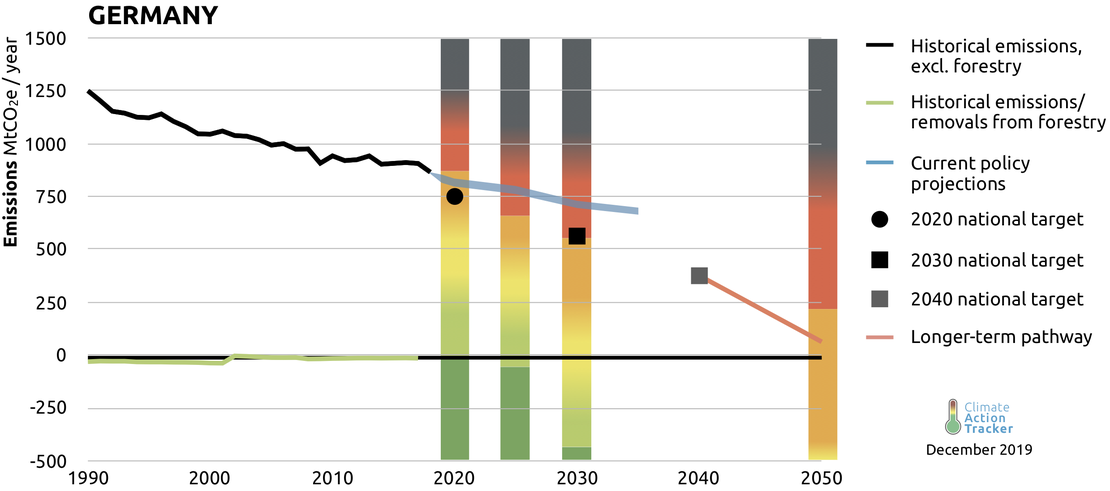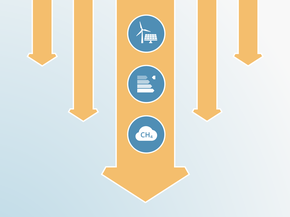Country summary
Overview

The German government’s new Climate and Energy Package, agreed in September 2019, does not contain enough policy action to meet its own emissions reduction targets for 2020 and 2030, which themselves are outdated and insufficient. The CAT rates Germany’s 55% emissions reduction target for 2030 (agreed in 2010) as “Highly Insufficient”; it needs to be strengthened to be compatible with the Paris Agreement.
Earlier changes in regulation have almost completely stopped expansion of wind power in 2019 and the new Climate and Energy Package will not reverse this trend. The package also lacks a clear long-term vision to reach its envisaged goal of climate neutrality by 2050. The new, positive structural elements to German policy - a coal phase-out, a carbon price on fuels in buildings and transport, and an overarching climate law - lack sufficient quantitative ambition to meet the government’s targets, let alone the Paris Agreement’s mitigation challenge.
On coal, the proposed phase-out schedule of 2038 is almost a decade too slow to meet the objectives of the Paris Agreement, and there is even a hint that a new coal-fired power station may go online in the short term. The phase-out schedule was proposed by a multi-stakeholder commission in combination with compensation to local people and companies of up to €50 bn EUR to compensate for the 20 000 jobs that will be lost in the coal industry.
The government has already acknowledged it will not meet its 40% reduction target for 2020. The CAT’s current projections indicate emissions reductions of 33% to 36% by then compared to 1990. The failure to meet the 2020 target would result in a cumulative 1 GtCO2e of additional emissions compared to the original target path, and hence adds significantly to the mitigation task.
Meanwhile, after previously leading in providing new renewable energy capacity in electricity, capacity additions of wind and solar have slowed down significantly, putting the whole industry at risk. Less than half the amount of PV is being built today compared to the peak years of 2010-2012; onshore wind is down to roughly a tenth of its 2017 peak. More jobs were lost in the last decade in both sectors individually than people currently employed in the coal sector. In addition, the measures in the new Climate and Energy Package are not enough to accelerate development to meet the government’s 2030 renewable electricity target of 65%.
On the basis of the September 2019 Climate and Energy Package, in November 2019, the first chamber of the German parliament (Bundestag) adopted a national climate law and associated regulations, which have only been partly confirmed by the second chamber (Bundesrat). It includes only the national 2030 climate target and the “commitment to pursue greenhouse gas neutrality by 2050 as a long-term goal”. The national climate law distributes the 55% reduction by 2030 target to sectors and gives implementation responsibility to sector ministries. While this improves accountability, the associated measures are not ambitious enough and have been heavily criticised by German environmental organisations and opposition parties.
The package also includes a new carbon price for the building and transport sectors. The impact of this new system is very difficult to predict, but the effect of the initial price of 10 EUR/tCO2 will be minimal.

Based on this target we rate Germany “Highly Insufficient”.

According to our analysis, Germany is not on track to meet its national targets for either 2020 or 2030, and will need to implement additional policies to do so.
The Climate and Energy Package the government put forward in September 2019 - and which is part way through parliamentary approval - distributes the 55% reduction target by 2030 to sectors and gives implementation responsibility to sector ministries. In the event of the targets not being met, the Building and Transport Ministries would be responsible for paying the fines due under EU regulation. If Germany doesn’t implement any additional climate policy measures to meet its targets, it may have to pay compensation in the order of €60 bn Euro (Agora Energiewende and Agora Verkehrswende, 2018; Höhne and Fekete, 2019). The Climate and Energy Package measures are not ambitious enough, and have been heavily criticised by German environmental organisations and opposition parties.
The new draft climate law includes the “commitment to pursue greenhouse gas neutrality by 2050 as a long-term goal”. This was included despite the difficulties the German government had earlier in 2019 to clearly commit to such a goal.
In the energy sector CO2 emissions from coal power have declined in recent years and the share of renewable energy in electricity has risen, but in 2018 about one third of German CO2 emissions still came from coal-fired power plants. Capacity additions for all major renewable energy technologies are still not sufficient, with onshore wind almost coming to a standstill in 2019 after a change in regulation. The government’s target - to raise the share of electricity generated from renewable energy to 65% of gross electricity consumption by 2030 - will not be met under its currently implemented policies.
In January 2019, a multi-stakeholder Coal Commission found a compromise for phasing out coal-fired power generation (Kommission „Wachstum Strukturwandel und Beschäftigung“, 2019). Of the 43 GW of currently-installed coal capacity, the commission proposed shutting down 13 GW by 2022, an additional 13 GW by 2030 and phasing out all production by 2038, with the option of bringing this date forward to 2035. This compromise was found only by an agreement to compensate the affected regions (€40 bn EUR) and the affected companies operating the coal power plants (planned are €180 m EUR per GW resulting in the order of an additional €5-10 bn EUR) (Agora Energiewende, 2019; Bundesministerium für Wirtschaft und Energie, 2019). The positive aspect of this is that the compromise received broad societal consensus. However, the schedule still is not fast enough to be compatible with a 1.5°C pathway that would require a coal phase-out by 2030 (Climate Analytics, 2018).
As of 2021, emissions trading will be introduced on fuels in the transport and building sector. Certificates will be distributed for a fixed price of 10 Euro/tCO2 in 2021 rising to 35 Euro/tCO2 in 2025. The overall impact of this new system is very difficult to predict, but it’s clear the initial price of €10 EUR/tCO2 will have only a small effect, for example increasing fuel prices only by 3 Eurocents per litre.
Further analysis
Latest publications
Stay informed
Subscribe to our newsletter




